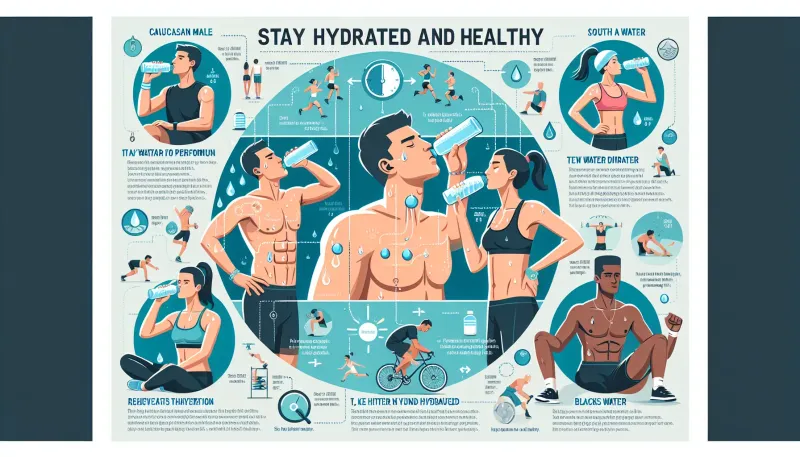The Importance of Water Intake During Exercise: Stay Hydrated and Healthy

Learn why water intake during exercise is crucial for your health and performance. This comprehensive guide covers hydration tips, benefits, and guidelines.
Staying hydrated during exercise is critical for maintaining optimal performance and health. Water intake during exercise is essential to compensate for fluid lost through sweat, regulation of body temperature, and ensuring proper function of all bodily systems. In this comprehensive guide, we'll explore the importance of staying hydrated, provide practical hydration tips, and examine the benefits and guidelines for water intake during exercise.
Why Hydration is Crucial During Exercise
Water plays a vital role in nearly every bodily function. Proper hydration is particularly critical during exercise for several reasons:
1. Regulating Body Temperature
During exercise, your body generates heat. Sweating is the primary mechanism for cooling your body down, but it leads to fluid loss. Adequate water intake helps maintain body temperature within a safe range.
2. Preventing Dehydration
Dehydration can negatively impact athletic performance and health. Symptoms of dehydration include dizziness, fatigue, dry mouth, and even heatstroke in extreme cases. Consistent water intake mitigates these risks.
3. Supporting Muscle Function
Muscles require proper hydration to function smoothly. Water aids in delivering essential nutrients that muscles need to perform efficiently and recover rapidly.
4. Facilitating Metabolic Processes
Water is crucial for metabolic functions, including fat oxidation and energy production. Staying hydrated ensures these processes run effectively, optimizing overall performance.
Hydration Strategies for Exercise
Effective hydration strategies can vary depending on the type, duration, and intensity of exercise. Here are some general guidelines to help you stay hydrated:
Before Exercise
Aim to drink about 500 ml to 600 ml of water two to three hours before exercising. This pre-hydration helps ensure that your muscles and organs are adequately hydrated.
During Exercise
Try to drink 200 ml to 300 ml of water every 10 to 20 minutes during exercise. Adjust these amounts based on your sweat rate and the environmental conditions. Longer and more intense workouts may require more frequent hydration.
After Exercise
Post-exercise hydration is crucial for recovery. For every pound (about 0.45 kg) of weight lost during exercise, drink approximately 500 ml of water. This helps replace lost fluids and accelerates recovery.
Benefits of Proper Hydration
Keeping your body hydrated brings numerous benefits that impact both your exercise routine and overall well-being.
1. Enhanced Physical Performance
Hydration boosts energy levels, delays the onset of fatigue, and allows you to work out longer and more effectively.
2. Improved Cognitive Function
Water intake supports brain function, helping maintain focus and concentration during exercise.
3. Better Joint Health
Water helps lubricate joints, reducing the risk of injuries and improving comfort during physical activity.
4. Optimized Digestion and Nutrient Absorption
Adequate hydration aids digestion and ensures that nutrients from food and supplements are absorbed efficiently.
5. Faster Recovery
Staying hydrated helps reduce muscle soreness and potential cramps, facilitating quicker recovery post-exercise.
Common Myths About Hydration
Despite the evidence supporting hydration, several myths persist. Let's address some common misconceptions:
Myth 1: Drink Only When Thirsty
Thirst is a late indicator of dehydration. By drinking only when you're thirsty, you might already be dehydrated. It's essential to maintain a consistent hydration strategy.
Myth 2: All Drinks Hydrate Equally
Not all beverages are created equal when it comes to hydration. Caffeinated and alcoholic drinks can have a diuretic effect, leading to increased fluid loss. Water remains the best choice.
Myth 3: Clear Urine Means Complete Hydration
While clear urine can be an indicator of proper hydration, it might also mean you're over-hydrating. Pale yellow urine is often a more accurate indicator of optimal hydration.
Hydration Tips for Athletes
Special considerations are necessary for athletes who undergo rigorous training. Here are tailored tips to help athletes stay hydrated:
1. Use Electrolyte Solutions
For long-duration or high-intensity exercise, consider drinks that include electrolytes like sodium and potassium. They help maintain fluid balance and muscle function.
2. Monitor Sweat Rate
Knowing your sweat rate can guide how much fluid you need. Weigh yourself before and after exercise to determine your fluid loss and adjust your intake accordingly.
3. Check Urine Color
Regularly monitor the color of your urine. As mentioned, pale yellow urine is an indication of good hydration.
4. Drink Throughout the Day
Athletes should focus on maintaining hydration throughout the entire day, not just during workouts. This helps their body stay consistently optimized for performance.
Conclusion
Water intake during exercise is pivotal for sustaining peak performance and promoting overall health. Understanding the importance of hydration enables you to adopt strategies that keep you adequately hydrated before, during, and after exercise. Staying mindful of your hydration needs enhances physical and cognitive performance, supports recovery, and ensures long-term well-being. Prioritize your hydration as an integral part of your fitness routine and enjoy the numerous benefits it brings.



























